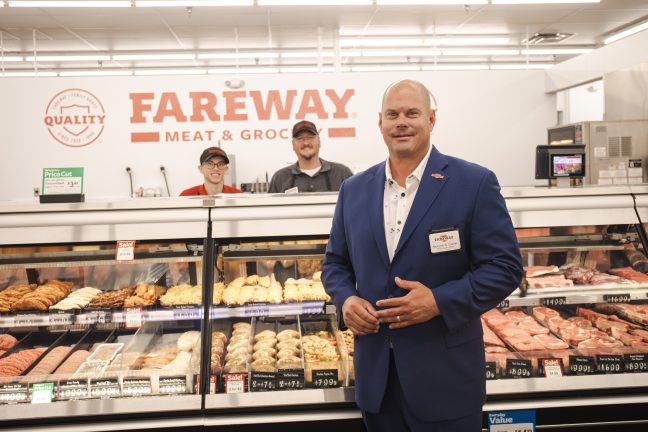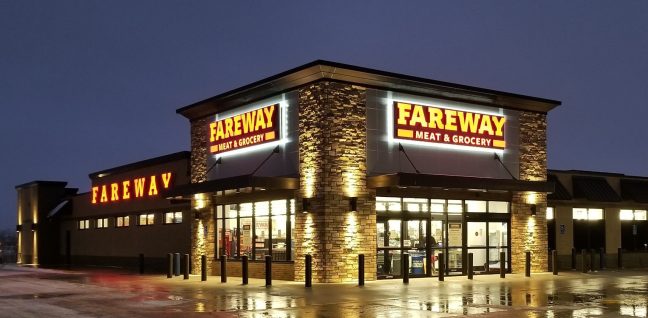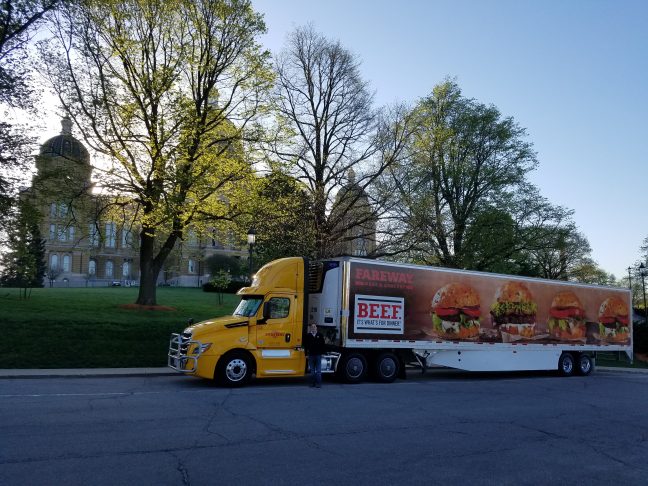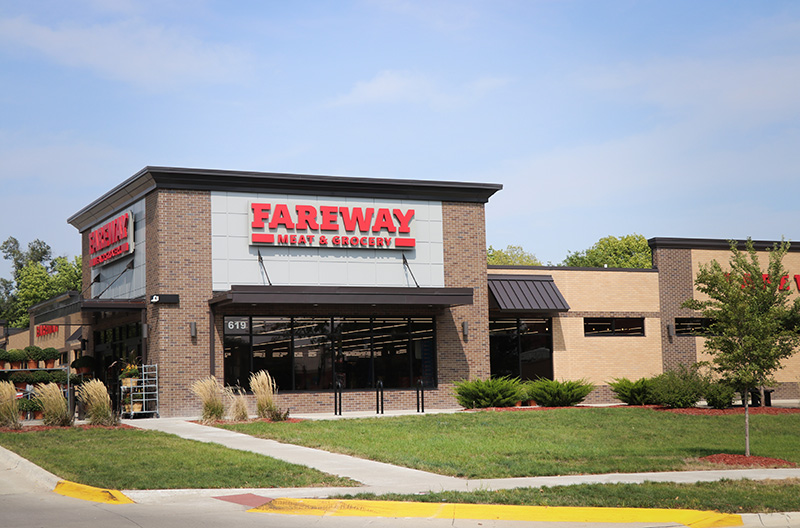By Carol Radice
Fareway opened its first grocery store in 1938 in Boone, Iowa. While much has changed at this Midwest chain over the past 85 years, many things have remained the same.
The leadership team – headed by CEO Reynolds Cramer, who is the fourth generation in his family to run the company – has diligently worked to ensure Fareway stayed the course his great-grandfather set many years ago and that the principles the company was founded on remain true today.

At the same time, Cramer and his team have also made sure Fareway continues to evolve, believing that being open to trying new concepts and ideas are important for growth. It is that blend of past and present for which The Shelby Report of the Midwest has selected Fareway as its 2023 Midwest Retailer of the Year.
Today, Fareway operates in seven states across the Midwest, including Iowa, Illinois, Kansas, Minnesota, Missouri, Nebraska and South Dakota – and soon to be Wisconsin. Store sizes – modest by most definitions – vary from 8,000 to 36,000 square feet. They operate under several banners – Fareway Meat and Grocery, Fareway Meat Market and its online business, FarewayMeatMarket.com.
Not an operator to follow the trends for the sake of simply following them, under his leadership Cramer has made sure that if Fareway signs off on doing something new it is because the idea is worthy of doing. And then once committed, the company puts 150 percent effort behind the idea to make it happen.
It is this ability to pivot when needed and an unwavering set of principles that has helped Fareway not only succeed but thrive in today’s retail market.
Staying focused
“Two of the most crucial areas of our business are our employees and our customers,” Cramer said. “Our employees are our lifeblood and what enable us to open our doors every day – from the people in maintenance and the warehouse to our truck drivers and the folks working in our stores.
“And our customers…we know how important it is that our customers feel seen and heard. We only have a short window of opportunity when a customer enters our store and our goal is to make sure we are always on point so that every experience with us is a good one.”
On top of this, the leaders at Fareway want to be good stewards of the land and buildings. “We want to be good community citizens and be part of growing neighborhoods, but you cannot do any of this unless you focus on employees and customers,” Cramer added.
Nearly every market in which Fareway operates is heavily represented by a variety of retail competitors and formats. For Garrett Piklapp, president, Fareway represents many things to many people.
“We are your neighborhood grocer with an unbeatable meat counter experience,” he said. “We are committed to quality products, fair prices with unmatched service, which still includes carrying out groceries to customers’ vehicles and being closed on Sunday.”
It is this focus on how to offer customers value that has helped Fareway stand apart. Since value means different things to different customers, the company strives to offer value in a wide array of ways.

“We are continually evaluating price, selection, service, convenience, cleanliness and our community outreach as part of how we provide value to our customers, employees and communities,” Piklapp explained.
As a self-distributed operator, Fareway gains many competitive advantages, chief among them is the ability to offer level pricing throughout all its stores, regardless of where they are located.
The company’s top priority is quality and another way to communicate that is through a quality stamp on products. “The quality stamp is our promise to offer products made from the highest standards,” Piklapp said. “It symbolizes our commitment to achieving the highest quality within every Fareway product.”
Expanding on this, Cramer said the company’s meat department is a key part of that quality mission. The company’s partnerships with local farmers help to support the local economy and enable it to offer quality meat throughout its stores. Only USDA choice and above, along with some specialty items, can be found in a Fareway meat case.
“Each meat order is prepared for the individual customer,” Cramer said. “We are all about fresh and offering a variety of selections daily. Customers come to us because of this and enjoy knowing they can pick their thickness and we will cut it to order.” Fareway’s meat program has become so renowned that to meet demand the company developed an online program.
The company’s missives frequently mention the significant role family values play at Fareway, something Piklapp said will never waiver.
“Family signifies a strong bond, rooted in loyalty, commitment, love and kindness. We hope our customers and our employees feel this accurately represents what Fareway stands for,” he said.
Willingness to change
For the leaders at Fareway, surviving in today’s retail environment means a readiness to change when needed. One way this can be seen is in the alterations Fareway recently made to its store design and size.
The mindset used to be that retailers needed to build stores larger than 25,000 square feet to compete, but as Cramer said, “The reality is you need to have the right size stores for what you sell.”
He noted the thought process 50 years ago was customers will come to you because you sell quality products at a fair price.
“Well, since then the landscape has changed,” Cramer said. “Given that there are many retailers selling quality products at fair prices the idea that price is a lead factor in the customer’s choice of where to shop is not as accurate as it used to be.

“We know what we do well and realized we do not need a big store format to do that. Today, it is all about the total customer experience.”
With this as the backdrop, Fareway made some adjustments to the overall appearance of its stores. Subtle changes were made with flooring, lighting and general store ambience to create a more inviting environment to shop.
“Trust is important, yes, but we also need to create a comfortable experience for shoppers. I think we have done a good job of finding the sweet spot with this,” Cramer said. “We found ways to enhance the customer experience without going overboard.”
Beyond aesthetics, Fareway has also developed a range of store formats and sizes that gives it the dexterity to serve a variety of areas, including rural communities and food deserts.
“Many communities in the Midwest have lost their grocery stores and they have approached us about partnering with them,” Cramer said. “We view the opportunity to enter new areas such Ogden, Iowa, as a catalyst for helping communities grow whether it be with housing or attracting new business to the neighborhood.”
In the past, the company had two models of stores it worked with and the size of the store built was largely based on the community’s size.
“Today, instead of us coming in and dictating size based on what would work solely for us, we are looking at what the right fit is for that community,” Cramer said. “Whether a neighborhood has no stores or just one, we have an A, B, C, D and E model now to pull from, which puts us in an ideal position to determine what the perfect fit is for all of us.”
Fareway has plans to open its first store with solar panels in 2024, something Cramer called “a learning experience.” If this proves effective, he said more planned store builds will incorporate solar.
“For us, there is not a one-size-fits-all approach or a set-in-stone way of doing business,” Cramer said. “We understand we need to be open to trying things that make sense for us and adjusting as needed.”
Future forward
In spring 2024, the company will be moving its headquarters from Boone about 35 miles south to Johnson, a move Cramer said will help the company become more efficient. However, Fareway has no plans to leave Boone – the soon-to-be-former headquarters will become the new home for about 45 wholesale office employees.
“Our commitment to Boone is stronger than ever,” Cramer said. “It really does not matter where our headquarters is. What matters is that we take care of the communities that we work and live in.
“Today, when so many are struggling to get employees back to the office, I can tell you we have more than 140 employees who are excited to go to this new office building.”
Fareway has a goal for continued expansion, striving to exceed to 200 stores. The formats will be a blend of larger stores, smaller markets and those that address needs in rural areas.
The company also is looking to expand its market reach into Wisconsin. According to Cramer, officials are exploring sites and options.
“There are a lot of opportunities out there. Some of the independent operators in the Wisconsin area are without a succession option and so they may be one expansion possibility for us,” he said.
“After 85 years, you would think we would change the way we go to market and be tempted to deviate from our founders’ mission,” Cramer said. “But after all this time, we have not only stuck to our principles, we have actually gotten better at doing what we do.”
Read more from The Shelby Report’s Retailer of the Year sections.

